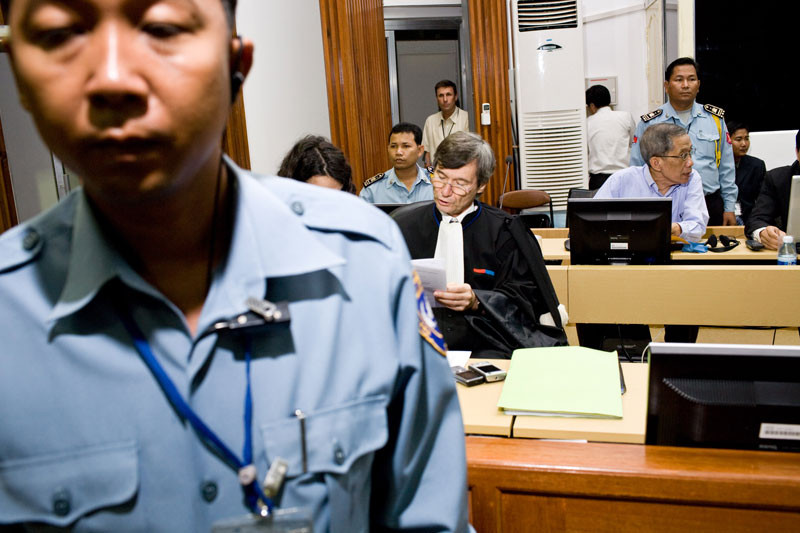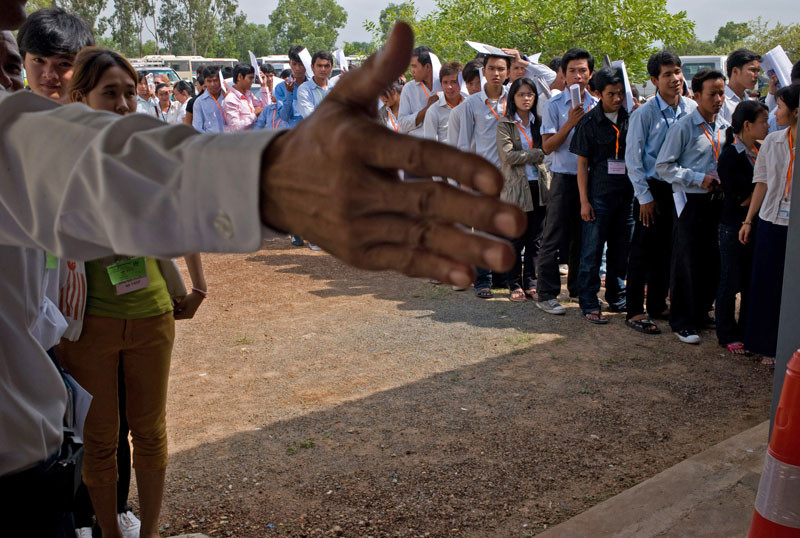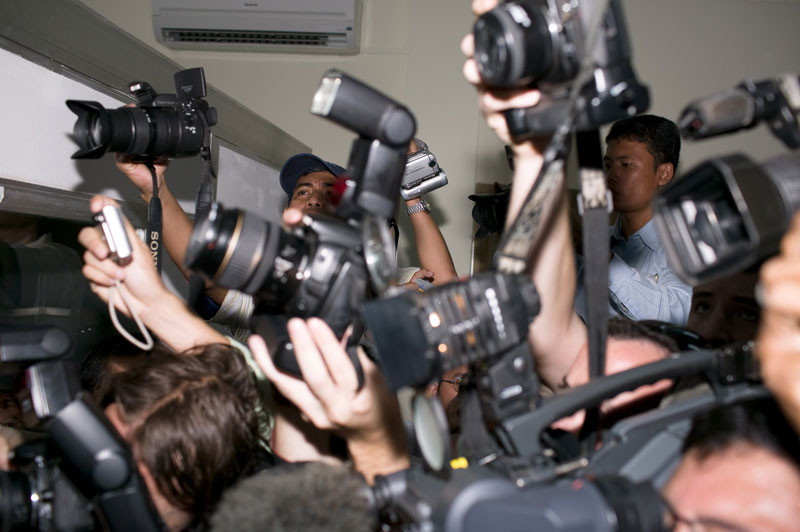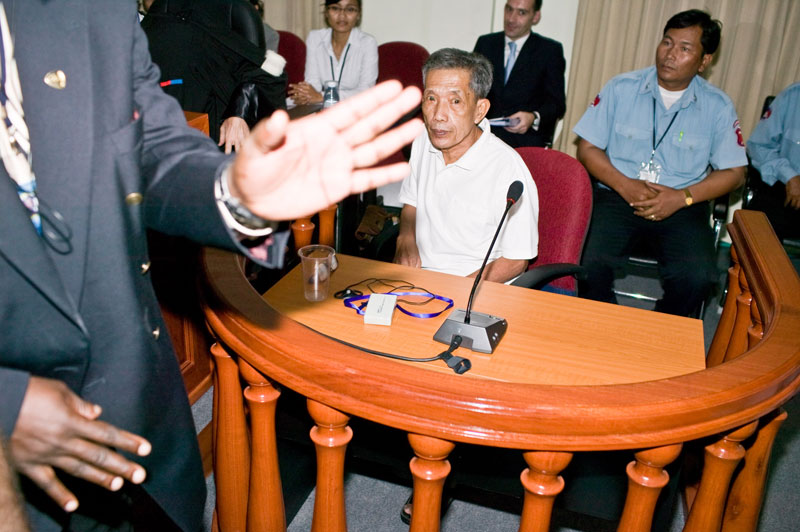“The truth is a hard thing to articulate, let alone take responsibility for. Though we have good reason to decry the torturers’ failure to speak to the truth, the temptation to omit and obfuscate the unpalatable preys on us all. Who among us has not been tricked by his own memory or perception? In court, not even victims speak ‘nothing but the truth.’ No one ever speaks ‘nothing but the truth.’”
So says Thierry Cruvellier in his book, “The Master of Confessions: The Making of a Khmer Rouge Torturer,” a depiction of Kaing Guek Eav—better known by the alias Duch—and a gripping account of Duch’s 2009 trial.

As director of the Tuol Sleng security center, or S-21, the Khmer Rouge’s notorious prison in Phnom Penh, Duch oversaw the torture and execution of more than 12,000 people between 1975 and 1979.
He is also the only member of Pol Pot’s communist regime, which led to the deaths of nearly two million people, who has admitted his guilt and declared repentance for his crimes during his trial.
The case became unique among international war crimes tribunals in that Duch stood trial even though he had pleaded guilty. In most countries where such hearings have taken place—Rwanda, Sierra Leone, Bosnia—the common law system means submission of a guilty plea spares mass murderers, torturers and dictators from taking the stand.
“It’s interesting in terms of the economic [rationale]; it’s less costly, you don’t have the full costs of the trial,” Mr. Cruvellier said in an interview. “It’s very detrimental in terms of history-telling and the understanding of the crime because you lose entirely the voice of the perpetrator.”
But Duch faced those who suffered as a result of his actions, including survivors of S-21 and victims’ family members, day in and day out over the course of his trial.
“Duch was on the stand every day over a period of six to nine months, and I think that never before at international level did you have access to the perpetrator [of] such crime. So in that sense, it was a unique opportunity to understand a little bit better how people who were not criminals before become mass murderers.”
Mr. Cruvellier, a veteran French journalist who spent 15 years observing and writing about international war crimes tribunals, attended every day of Duch’s trial.
The resulting book—released in French in 2011 and in English last year—is a thoughtful, compelling exploration of the regime, its victims and, of course, one of the men responsible for so many deaths.
Through it all runs the thread of conflicting truths. For each person involved in the trial, the truth differs.

As the director of S-21, Duch kept detailed records of every prisoner who entered the center and, as was the fate of almost all of them, died there. He proclaimed his remorse, which shaped his narrative of the truth, but the victims were—understandably—largely deaf to his protestations.
“The thing is, his remorse is sometimes difficult to accept or to recognize because of his own behavior, because of the fact that there are things that he doesn’t want to acknowledge and because of the incredible psychological defense system that he has built which protects him from, basically, collapsing,” Mr. Cruvellier explained.
“If he fully acknowledged his crime, it might be perhaps too hard to live with it. So Duch has developed a number of defense mechanisms that very often come across as manipulation, as lack of sensitivity or even as sarcasm.
“And all of these signs are in our view not compatible with genuine remorse, but I think they are. I think it’s more complicated than that and I think you can be both genuinely repentant and not fully repentant.”
The most confronting truth in the book is Mr. Cruvellier’s terrible conclusion that each one of us has the capacity, given the right set of circumstances, to become a mass murderer like Duch, who was a teacher before and after joining the Khmer Rouge.
“Duch is a criminal over a period of eight years. He has not been before and he has not been after, and won’t be. Any doctor who examined him would not consider him a psychopath or a schizophrenic or [as having] any other psychiatric diseases,” Mr. Cruvellier said.
“Mass crime works with mass participation and that means that many of us would participate—more or less actively—but we would.”
“That’s a very important conclusion that leads us to say that, yes, criminals in such kinds of political crimes are not monsters, they’re absolutely human beings…. If they were monsters, it would be easy because we could always say ‘They’re not one of us. We’re different.’ We can’t say that. We can’t. And that’s what is terrifying.”

Going into the trial, Mr. Cruvellier said, he knew it would be the last that he would cover. His first book was “Court of Remorse: Inside the International Criminal Tribunal for Rwanda,” which he covered in the mid-1990s. It was the first of several courts that he would grow to know intimately.
“The substance of what you’re dealing with is heavy—over the years, you don’t realize it, but at some point you do; it accumulates and it becomes almost a matter of mental health to move away,” he said of his decision to take a new path. “And then, there are other reasons. You also get to know how these tribunals function or how they misfunction, and at some point you also get disillusioned by many of these judicial processes, and then it’s time to go.”
This is another thread that runs through the book: the limitations of what such a court can ultimately achieve.
Although Mr. Cruvellier describes the Duch trial as “perhaps the best trial I have seen,” he is forthright in his assessment of war crimes tribunals, arguing that they often lose focus and drive.
“In Cambodia, that sense of urgency—like everywhere else—has been largely lost by court officials, and so the processes becomes gradually more of a bureaucratic process than something where you feel the upper goal is to deal with particularly traumatic history,” he said of the Extraordinary Chambers in the Courts of Cambodia.
To date, the ECCC, which was established in 2006, has spent about $200 million, largely funded by international donors. Just three people have been convicted: Duch in Case 001, and “Brother Number Two” Nuon Chea and the regime’s head of state, Khieu Samphan, in Case 002/01. Khmer Rouge Foreign Minister Ieng Sary died in the middle of his trial, while his wife, Ieng Thirith, was declared mentally unfit to stand trial.
The second part of Case 002 drags on—it is expected to finish by 2017—with the two defendants well into their 80s and disengaged from the process. Both are already serving life sentences and maintain their right to silence in the courtroom.
“[E]ventually, the whole system becomes even more stuck in that sense because there is little to get from the second trial even though it is dealing with the most important crimes of the regime, which is a bit of a paradox of the Cambodian court, that it ends up dealing with the most important crimes of the regime at the point where few people pay attention because it’s been going on for too long and the two defense teams are really probably not ready for anything that would amount to a search for the truth,” Mr. Cruvellier said.

Meanwhile, the government-opposed cases 003 and 004 had been stalled for years until the international co-investigating judge in the cases, Mark Harmon, charged three suspects earlier this year. But a question mark still hangs over whether Khmer Rouge Navy commander Meas Muth, district chief Im Chaem and Central Zone official Ta An will ever face the court.
Mr. Cruvellier said the international community was well aware that the hybrid U.N.-Cambodian court would only ever go as far as the government wants it to go.
“The danger with all this, which is also something that has happened at other tribunals, is that it ends up being seen with a lot of cynicism by most people because it looks hypocritical. The hypocrisy of everyone in the process, both the Cambodian government and the international players, is part of what affects tremendously the credibility of this court among the population or the media, for that matter. And for good reason.”
So, after all these years, what role has the court played? Has it achieved any semblance of justice? Is that even possible after the deaths of two million people?
Mr. Cruvellier argues that although the prosecution of a small handful of those responsible has been symbolic, such symbolic actions are nevertheless important, and the court has played an indirect yet important role in opening up debate about the Khmer Rouge period.
“Should it last that long, should it cost that much, are different questions that I think are still valid and should be asked.But at the end of the day, probably all of this will be forgotten and what will remain will be the conviction of these three individuals, the official sanction of the Khmer Rouge regime and the opening of a national debate on Pol Pot’s time.”




